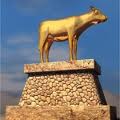 What do we remember of religious school? Memorizing Hebrew letters? Learning the melody to particular prayers? Creating a Rorschach map of Israel, perhaps?
What do we remember of religious school? Memorizing Hebrew letters? Learning the melody to particular prayers? Creating a Rorschach map of Israel, perhaps?
One of the things our Religious School aims to do is to familiarize our children with Torah stories. We want our children to connect with this lovely fact: Any story, any verse in our tradition can give rise to innumerable and wholly relevant questions.
Our Torah and the midrash – the rich rabbinic commentary it has generated – is a treasure worth unpacking. Our ancestors’ enigmatic silences or their passionate appeals, their struggles and their troubles can speak to our children – and to us.
Take this midrash: As Moses approached his wayward people with the Ten Commandments, a people wildly celebrating the creation of the Golden Calf, the letters on the tablets he carried flew off the stone. The tablets became too heavy to hold. No wonder he threw them from his arms; no wonder they splintered into pieces.
What happens when humanity violates the most essential principles, the most foundational elements of creating a just society? Even our children can and have imagined consequences. We adults see them writ large each day in the news – from the murder of families to the genocide of peoples.
Our Torah tells us that our people forgot their commitment to build a just society. They forgot their vow to God at Sinai. The stones became too heavy to carry because Moses bore the burden of human arrogance.
Or perhaps he carried their fear? They stand vulnerable in the wilderness. Where is God? Where is their leader? What have they committed to? Another midrash tells us that Moses broke the tablet to safeguard the people he loved. He didn’t want them to be held responsible for what they hadn’t yet received. If they hadn’t received the law, they could not be said to have violated it. Moses understood the Israelites’ anxiety. What had they ever known but slavery? How could they understand the responsibilities of freedom?
The rabbis even imagine Moses challenging God. In this commentary, Moses asks: “Do you not remember that Israel learned idolatry in the land of idolaters? Who put them there but You?!”
Torah: a rich and sweet and challenging source for the questions humanity has always faced, for the questions we ourselves face. Do we know what it is to forget a promise? Do we know what it is to be lost in a wilderness in which our fear makes us unsteady, our decisions imbalanced and wrongheaded?
Ask the children what they are learning from their stories. Consider taking a moment to read a little Torah on Shabbat. Torah speaks to the human condition in any time. It helps us learn who we are and who we hope to be.




